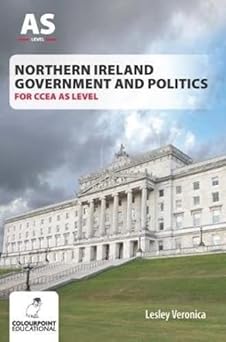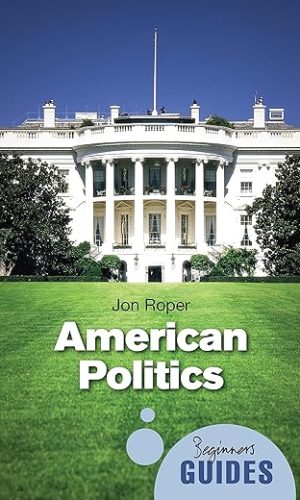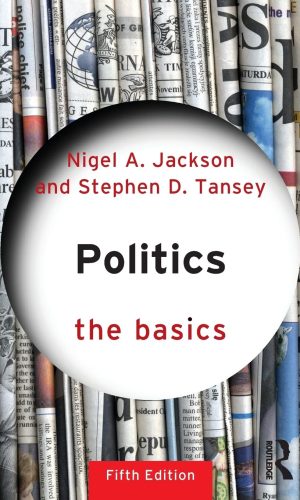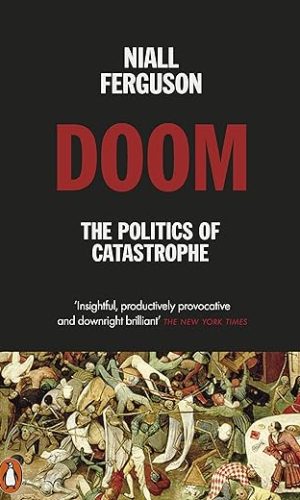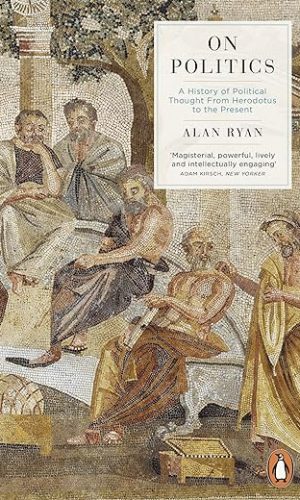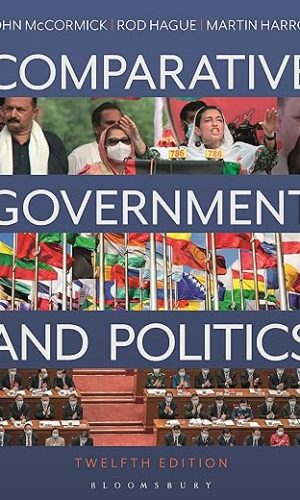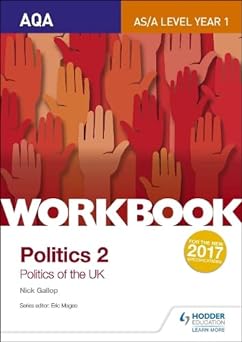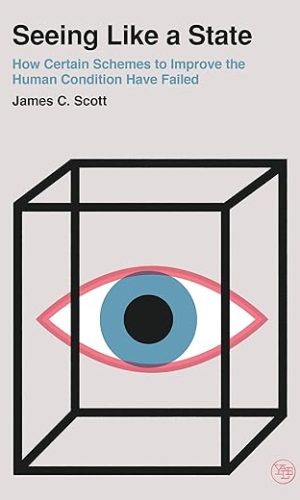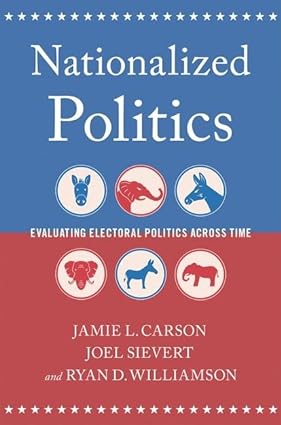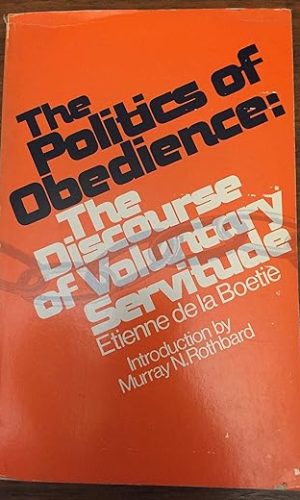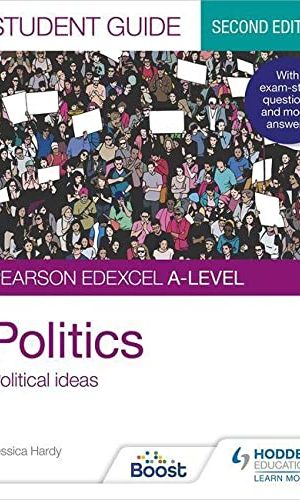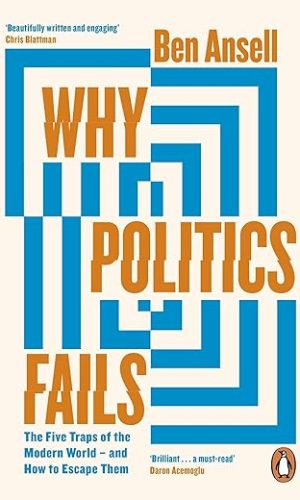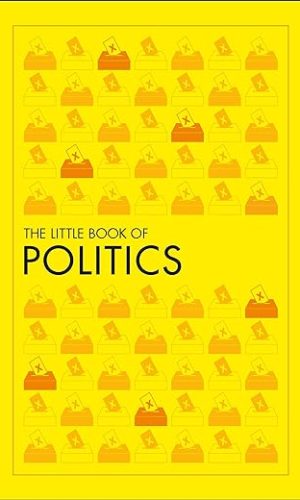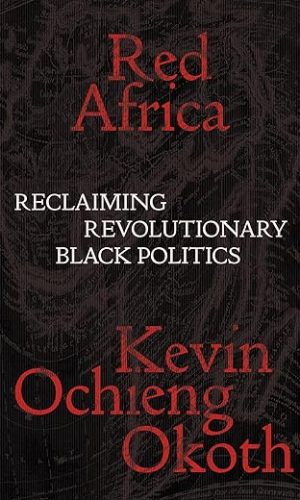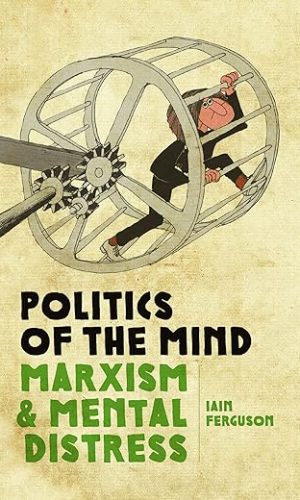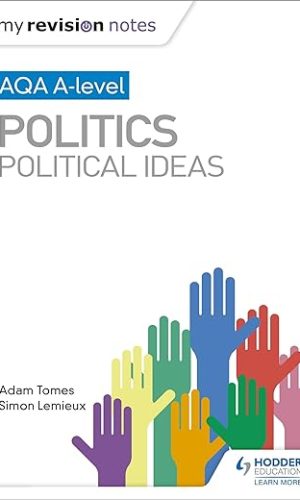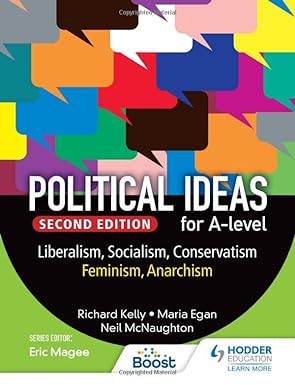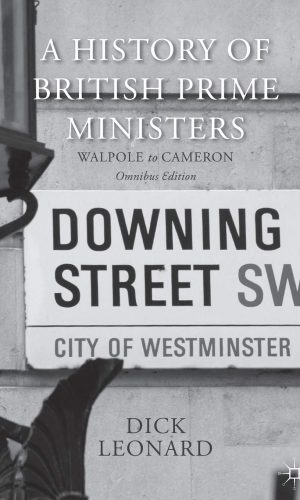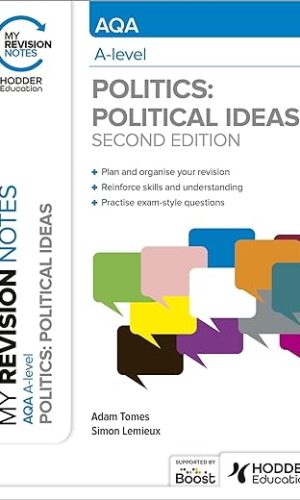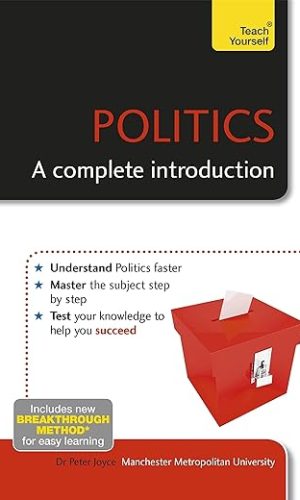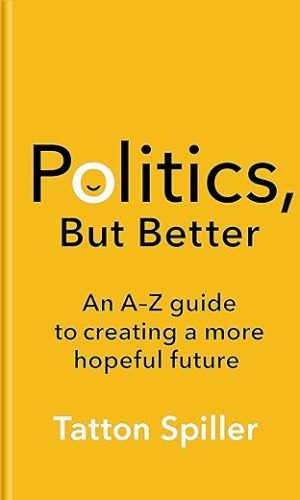Political Science & Ideology
-
Northern Ireland Government and Politics for CCEA AS Level
This well-researched text was written specifically to address Unit AS1 of the current CCEA Government and Politics AS Level specification. It covers the Government and Politics of Northern Ireland and has been through a meticulous quality assurance process.
It considers the implementation of the Good Friday Agreement, the amendments made in subsequent agreements (St Andrews, Hillsborough and Stormont House) and examines the functions and responsibilities of the Northern Ireland Assembly, the executive and various political parties.
Included in the book are tasks, practice essay titles, key terms and concepts, as well as a detailed glossary, index and examination preparation guide.
Areas explored include:
* The principles, content and implementation of the Good Friday Agreement and the changes made to it by subsequent agreements.
* An analysis of the Assembly, including its three main functions (representation, legislation and scrutiny), and its independence from the Executive.
* A look at the Executive Office and the Executive as a whole – how it disappointed, how it can determine legislation and policy, the divisions within it, and its ability to function as a power-sharing government.
* An evaluation of the Northern Ireland political parties, including their role in government, their respective backgrounds, strategies and policies, and how they have changed since 1998.
Read more
£10.40 -
The End of the End of History; Politics in the Twenty-First Century
‘It’s been a long time since a text was so useful in helping me think through our present moment and my role within it. The End of The End of History is a clear, powerful and panoramic analysis of our world at the dawn of the 2020s.’ Vincent Bevins, author, The Jakarta Method
The End of History is over. The idea that Western liberal democracy was the final form of human government has been exposed as bluster: the old order is crumbling before our eyes. Angry anti-politics have arisen to threaten political establishments across the world. Elites have fallen into hysteria, blaming voters, populism, Putin, Facebook anyone but themselves. They are suffering from Neoliberal Order Breakdown Syndrome. Emerging from four years of interviews and debates on the popular global politics podcast Aufhebunga Bunga, The End of the End of History examines how the political consequences of the 2008 financial crisis have come home to roost. If Trump and Brexit shattered the liberal-democratic consensus in 2016, then the global pandemic of 2020 put a final end to the End of History. Politics is back, but its stranger than ever.Read more
£10.70£12.30 -
American Politics: A Beginner’s Guide (Beginner’s Guides)
To understand the world events today, you need to understand American politics. Exploring the principles enshrined in the Declaration of Independence and the Constitution, Jon Roper provides a sharp analysis of how history has shaped the way America governs itself. Examining the recent emergence of the right-wing Tea Party movement, President Obama’s administration, American foreign policy, and the role of powerful lobbies, this is the perfect primer for anyone interested in the world’s most powerful (and controversial) country.
Read more
£8.40£9.50 -
Politics: The Basics
Now in its fifth edition, Politics: The Basics explores the systems, movements and issues at the cutting edge of modern politics. A highly successful introduction to the world of politics, it offers clear and concise coverage of a range of issues and addresses fundamental questions such as:
• Why does politics matter?
• Why obey the state?
• What are the key approaches to power?
• How are political decisions made?
• What are the current issues affecting governments worldwide?
Accessible in style and topical in content, the fifth edition has been fully restructured to reflect core issues, systems and movements that are at the centre of modern politics and international relations. Assuming no prior knowledge in politics, it is ideal reading for anyone approaching the study of politics for the first time.
Read more
£17.30£19.00Politics: The Basics
£17.30£19.00 -
Harrington: The Commonwealth of Oceana and A System of Politics (Cambridge Texts in the History of Political Thought)
James Harrington’s brief career as a political and historical theorist spans the last years of the Cromwellian Protectorate and the Restoration of 1660. This 1992 volume comprises the first and last of Harrington’s writings. Harrington was the first theorist to interpret the English Civil Wars as a revolution, the result of a long-term process of social change which led to the decay of the old political order. The Commonwealth of Oceana (1656) is a fictionalised presentation of English history up to the victory of the New Model Army, explaining the fall of the monarchy and proposing a republic to replace it. A System of Politics, written after the Restoration, is a scheme of history and political philosophy erected on the foundations of his previous works. Professor Pocock’s introduction emphasises Harrington’s place as a pivotal figure in the history of English political thought. This edition also contains a chronology of events in Harrington’s life and a guide to further reading.Read more
£28.50 -
Doom: The Politics of Catastrophe
‘Magisterial … Immensely readable’ Douglas Alexander, Financial Times
‘Insightful, productively provocative and downright brilliant’ New York Times
A compelling history of catastrophes and their consequences, from ‘the most brilliant British historian of his generation’ (The Times)
Disasters are inherently hard to predict. But when catastrophe strikes, we ought to be better prepared than the Romans were when Vesuvius erupted or medieval Italians when the Black Death struck. We have science on our side, after all. Yet the responses of many developed countries to a new pathogen from China were badly bungled. Why?
While populist rulers certainly performed poorly in the face of the pandemic, Niall Ferguson argues that more profound pathologies were at work – pathologies already visible in our responses to earlier disasters.
Drawing from multiple disciplines, including economics and network science, Doom: The Politics of Catastrophe offers not just a history but a general theory of disaster. As Ferguson shows, governments must learn to become less bureaucratic if we are to avoid the impending doom of irreversible decline.
‘Stimulating, thought-provoking … Readers will find much to relish’ Martin Bentham, Evening Standard
Read more
£10.10£12.30Doom: The Politics of Catastrophe
£10.10£12.30 -
On Politics
A magisterial, one-volume history of political thought from Herodotus to the present, Ancient Athens to modern democracy – from author and professor Alan Ryan
This is a book about the answers that historians, philosophers, theologians, practising politicians and would-be revolutionaries have given to one question: how should human beings best govern themselves?
Almost every modern government claims to be democratic; but is democracy really the best way of organising our political life? Can we manage our own affairs at all? Should we even try? In the west, do we actually live in democracies? In this extraordinary book Alan Ryan engages with the great thinkers of the past to show us how vividly their ideas speak to us in today’s uncertain world.
ALAN RYAN was born in London in 1940 and taught for many years at Oxford, where he was a Fellow of New College and Reader in Politics. He was Professor of Politics at Princeton from 1988 to 1996, when he returned to Oxford to become Warden of New College and Professor of Political Theory until his retirement in 2009. His previous books include The Philosophy of John Stuart Mill, Bertrand Russell: A Political Life and John Dewey and the High Tide of American Liberalism. He is a Fellow of the British Academy.
Reviews of On Politics:
‘An engaging and smart survey of major political thinkers … Through Ryan [they] speak directly to the present’ Mark Mazower, Prospect
‘Ryan’s book is a magnificent piece of work, clear (even when the ideas he’s exploring are obscure) and engaging (even when the theory in the original is forbidding) … anyone remotely interested in political theory will profit from reading or dipping into Ryan’s On Politics, whether this is their first acquaintance with the canon of political theory or whether they have been “Hobbing and Locking” for decades … It’s a remarkable experience’ Jeremy Waldron, New York Review of Books
‘Ambitiously and elegantly covers two and a half millennia of political thinking … despite covering huge intellectual terrain, [On Politics] a delight both when it explores detail and also when it draws conclusions of a broader perspective’ Justin Champion, BBC History Magazine
‘On Politics is crammed with smart observations and wise advice’ John Keane, Financial Times
‘An impressive achievement’ Economist
Read more
£12.30£14.20On Politics
£12.30£14.20 -
Politics: Ideas in Profile (Ideas in Profile – small books, big ideas)
Ideas in Profile: Small Introductions to Big Topics
In the first title of an exciting new series one of the world’s leading political scientists asks the big questions about politics: what is it, why we do we need it and where, in these turbulent times, is it heading? From the gap between rich and poor to the impact of social media, via Machiavelli, Hobbes and Weber, Runciman’s comprehensive short introduction is invaluable to those studying politics or those who want to know how life in Denmark became more comfortable than in Syria.
The Ideas in Profile series is what introductions can and should be. Concise, clear, relevant, entertaining, original and global in scope, Politics makes essential reading for anyone, from students to the general reader.
Read more
£7.20£8.50 -
Comparative Government and Politics
Offering a comprehensive introduction to the comparison of governments and political systems, this new edition helps students to understand not just the institutions and political cultures of their own countries but also those of a wide range of democracies and authoritarian regimes from around the world.This new edition offers:
-A revised structure to aid navigation and understanding
-New learning features, ‘Using Theory’ and ‘Exploring Problems’, designed to help students think comparatively
-Empirical global examples, with increased coverage of non-Western scholarship and analyses
-Coverage of important contemporary topics including: minorities; LGBTQ+ issues; identity politics; women in politics; political trust; populism; Covid-19.Featuring a wide range of engaging learning features, this book is an essential text for undergraduate and postgraduate courses on Comparative Politics, Comparative Government, Introduction to Politics and Introduction to Political Science.
Read more
£19.40 -
AQA AS/A-level Politics workbook 2: Politics of the UK
Exam board: AQA
Level: A-Level
Subject: Politics
First teaching: September 2017
First exams: Summer 2018Create confident, literate and well-prepared students with skills-focused, topic specific workbooks.
Our Student Workbooks build students understanding, developing the confidence and exam skills they need, whilst providing ready prepared lesson solutions.
– Supplements key resources such as textbooks to adapt easily to existing schemes of work
– Offers time-saving and economical lesson solutions for both specialist and non-specialist teachers
– Provides flexible resource material to reinforce and apply topic understanding throughout the course, as classwork or extension tasks, or with revision
– Creates opportunities for self-directed learning and assessment with answers to tasks and activities supplied online
– Prepares students to meet the demands of the specification by practising exam technique and developing their literacy skillsRead more
£5.70 -
30-Second Politics: The 50 most thought-provoking ideas in politics, each explained in half a minute
You may be OK with standard stuff like Conservatism and Democracy, but do you really know what Patrimonialism is? And what about Oligarchy? Anarcho-syndicalism?
Politics is, we are willing to bet, the most passionately argued-over subject matter, and yet how many of us flounder around in confrontational debates because we have no grip on political theory, just a vague notion that they are all out to get us?
30-Second Politics will help dispel this fog mistrust and paranoia. It challenges political theorists of all colors to come up with no-frill, no-spin, tell-it-like-it-is explanations of the 50 most important political -isms, -archies, and -ocracies that have pertained since the time of Periclean Athens. At no public expense, the book explains each political theory in nothing more than two pages, 300 words, and some propaganda-style imagery, for we all know that a picture opportunity is worth a thousand words of dull interview.
Read more
£3.00 -
My Revision Notes: AQA A-level Politics: US and Comparative Politics
Exam board: AQA
Level: A-level
Subject: Politics
First teaching: September 2017
First exams: Summer 2018 (AS); Summer 2019 (A-level)With My Revision Notes, every student can:
– Plan and manage a successful revision programme using the topic-by-topic planner
– Consolidate subject knowledge by working through clear and focused content coverage
– Test understanding and identify areas for improvement with regular ‘Now Test Yourself’ tasks and answers- Improve exam technique through practice questions, expert tips and examples of typical mistakes to avoidRead more
£3.60 -
Political Philosophy: A Very Short Introduction: 97 (Very Short Introductions)
This book introduces readers to the concepts of political philosophy. It starts by explaining why the subject is important and how it tackles basic ethical questions such as ‘how should we live together in society?’ It looks at political authority, the reasons why we need politics at all, the limitations of politics, and whether there are areas of life that shouldn’t be governed by politics. It explores the connections between political authority and justice, a constant theme in political philosophy, and the ways in which social justice can be used to regulate rather than destroy a market economy. David Miller discusses why nations are the natural units of government and whether the rise of multiculturalism and transnational co-operation will change this: will we ever see the formation of a world government?ABOUT THE SERIES: The Very Short Introductions series from Oxford University Press contains hundreds of titles in almost every subject area. These pocket-sized books are the perfect way to get ahead in a new subject quickly. Our expert authors combine facts, analysis, perspective, new ideas, and enthusiasm to make interesting and challenging topics highly readable.
Read more
£7.10£8.50 -
Seeing Like a State: How Certain Schemes to Improve the Human Condition Have Failed (Veritas Paperbacks)
“One of the most profound and illuminating studies of this century to have been published in recent decades.”―John Gray, New York Times Book Review
“A powerful, and in many insightful, explanation as to why grandiose programs of social reform, not to mention revolution, so often end in tragedy. . . . An important critique of visionary state planning.”―Robert Heilbroner, Lingua FrancaHailed as “a magisterial critique of top-down social planning” by the New York Times, this essential work analyzes disasters from Russia to Tanzania to uncover why states so often fail―sometimes catastrophically―in grand efforts to engineer their society or their environment, and uncovers the conditions common to all such planning disasters.
“Beautifully written, this book calls into sharp relief the nature of the world we now inhabit.”―New Yorker
“A tour de force.”― Charles Tilly, Columbia UniversityThe Institution for Social and Policy Studies
Read more
£12.10£14.20 -
Nationalized Politics: Evaluating Electoral Politics Across Time
In the United States, politics has become increasingly nationalized in recent years as voter decision-making is now driven by partisan or national political forces rather than the attributes of individual candidates. Indeed, voters now seem more concerned with which of the two national parties will be in power across all levels of government as opposed to which candidate will represent them individually. The phenomenon has now reached levels unseen since the nineteenth century, when the party ballot was in use and voters were generally unable to select among individual candidates.Nationalized Politics asks and answers the question, “how has nationalization influenced elections across different political eras?” Jamie L. Carson, Joel Sievert, and Ryan D. Williamson look at historical variation in nationalization through an analysis of congressional elections from 1840 to 2020. By examining roughly 180 years of elections, the authors leverage considerable differences in electoral competition, electoral rules, nationalization, polarization, and partisan advantage via the incumbency advantage. Moreover, Carson, Sievert, and Williamson employ a unique survey design to capture citizen attitudes toward the nationalization of politics to further consider the question of how nationalization is currently shaping politics. Providing a comprehensive history of US congressional elections, Nationalized Politics illustrates the roots of the current electoral landscape in the US.
Read more
£18.00 -
The Politics of Obedience: The Discourse of Voluntary Servitude
States are more vulnerable than people think. They can collapse in an instant—when consent is withdrawn.This is the thesis of this thrilling book. Murray Rothbard writes a classic introduction to one of the great political essays in the history of ideas.In times when dictators the world over are falling from pressure from their own people, this book, written nearly 500 years ago, is truly the prophetic tract of our times.Étienne de La Boétie was born in Sarlat, in the Périgord region of southwest France, in 1530, to an aristocratic family, and became a dear friend of Michel de Montaigne. But he ought to be remembered for this astonishingly important essay, one of the greatest in the history of political thought. It will shake the way you think of the state. His thesis and argument amount to the best answer to Machiavelli ever penned as well as one of the seminal essays in defense of liberty.La Boétie’s task is to investigate the nature of the state and its strange status as a tiny minority of the population that adheres to different rules from everyone else and claims the authority to rule everyone else, maintaining a monopoly on law. It strikes him as obviously implausible that such an institution has any staying power. It can be overthrown in an instant if people withdraw their consent.He then investigates the mystery as to why people do not withdraw, given what is obvious to him that everyone would be better off without the state. This sends him on a speculative journey to investigate the power of propaganda, fear, and ideology in causing people to acquiesce in their own subjection. Is it cowardice? Perhaps. Habit and tradition. Perhaps. Perhaps it is ideological illusion and intellectual confusion.La Boétie goes on to make a case as to why people ought to withdraw their consent immediately. He urges all people to rise up and cast off tyranny simply by refusing to concede that the state is in charge.The tyrant has “nothing more than the power that you confer upon him to destroy you. Where has he acquired enough eyes to spy upon you, if you do not provide them yourselves? How can he have so many arms to beat you with, if he does not borrow them from you? The feet that trample down your cities, where does he get them if they are not your own? How does he have any power over you except through you? How would he dare assail you if he had no cooperation from you?”Then these inspiring words: “Resolve to serve no more, and you are at once freed. I do not ask that you place hands upon the tyrant to topple him over, but simply that you support him no longer; then you will behold him, like a great Colossus whose pedestal has been pulled away, fall of his own weight and break in pieces.”In all these areas, the author has anticipated Jefferson and Arendt, Gandhi and Spooner, and those who overthrew Soviet tyranny. The essay has profound relevance for understanding history and all our times.As Rothbard writes in his spectacular introduction, “La Boetie’s Discourse has a vital importance for the modern reader—an importance that goes beyond the sheer pleasure of reading a great and seminal work on political philosophy, or, for the libertarian, of reading the first libertarian political philosopher in the Western world. For La Boétie speaks most sharply to the problem which all libertarians—indeed, all opponents of despotism—find particularly difficult: the problem of strategy. Facing the devastating and seemingly overwhelming power of the modern State, how can a free and very different world be brought about? How in the world can we get from here to there, from a world of tyranny to a world of freedom? Precisely because of his abstract and timeless methodology, La Boétie offers vital insights into this eternal problem.”Read more
£4.30 -
A New Structural Transformation of the Public Sphere and Deliberative Politics
Jürgen Habermas’s book The Structural Transformation of the Public Sphere, first published in 1962, has long been recognized as one of the most important works of twentieth-century social thought. Blending philosophy and social history, it offered an account of the public sphere as a domain that mediates between civil society and the state in which citizens could discuss matters of common concern and participate in democratic decision-making through the formation of public opinion. Now, in view of the digital revolution and the resulting crisis of democracy, he returns to this important topic.
In this new book Habermas focuses on digital media, in particular social media, which are increasingly relegating traditional mass media to the background. While the new media initially promised to empower users, this promise is being undermined by their algorithm-steered platform structure that promotes self-enclosed informational ‘bubbles’ and discursive ‘echo chambers’ in which users split into a plurality of pseudo-publics that are largely closed off from one other. Habermas argues that, without appropriate regulation of digital media, this new structural transformation is in danger of hollowing out the institutions through which democracies can shape social and economic processes and address urgent collective problems, ranging from growing social inequality to the climate crisis.
Read more
£9.50 -
The Politics of the Judiciary
This work presents the argument that given our legal system as it is now composed, the judiciary cannot act neutrally but instead must act politically. This edition has been updated to include material covering “Spycatcher”, the Guildford Four and Lord Denning.Read more
£4.40 -
Governance and Politics of China: 42 (Comparative Government and Politics)
The success or failure of China’s development will impact not only its own citizens but also those of the world. China is widely recognized as a global actor on the world stage and no global challenge can be resolved without its participation. Thus, it is important to understand how the country is ruled and what the policy priorities are of the new leadership. Can China move to a more market-based economy, while controlling environmental degradation? Can it integrate hundreds of millions of new migrants into the urban landscape? The tensions between communist and capitalist identities continue to divide society as China searches for a path to modernization.The People’s Republic is now over 65 years old – an appropriate juncture at which to reassess the state of contemporary Chinese politics. In this substantially revised fourth edition and essential guide to the subject, Tony Saich delivers a thorough introduction to all aspects of politics and governance in post-Mao China, taking full account of the changes of the 18th Party Congress and the 12th National People’s Congress. Further, the rise of Xi Jinping to power and his policies are examined as are important policy areas such as urbanization and the fight against corruption.
Read more
£32.30£37.00 -
Pearson Edexcel A-level Politics Student Guide 3: Political Ideas Second Edition
This Student Guide will help you to:
* Identify key content for the exams with our concise coverage of topics
* Avoid common pitfalls with clear definitions and exam tips throughout
* Reinforce your learning with bullet-list summaries at the end of each section
* Make links between topics with synoptic links highlighted throughout
* Test your knowledge with rapid-fire knowledge check questions and answers
* Find out what examiners are looking for with our Questions & Answers section, for the core political ideas, plus Anarchism, Feminism and NationalismRead more
£9.50 -
Politics: A Very Short Introduction (Very Short Introductions)
In this provocative but balanced essay, Kenneth Minogue discusses the development of politics from the ancient world to the twentieth century. He prompts us to consider why political systems evolve, how politics offers both power and order in our society, whether democracy is always a good thing, and what future politics may have in the twenty-first century.ABOUT THE SERIES: The Very Short Introductions series from Oxford University Press contains hundreds of titles in almost every subject area. These pocket-sized books are the perfect way to get ahead in a new subject quickly. Our expert authors combine facts, analysis, perspective, new ideas, and enthusiasm to make interesting and challenging topics highly readable.
Read more
£7.10£8.50 -
Higher Politics: Revise and learn (Bright Red Study Guides)
Get exam ready with our brand-new Higher Politics Study Guide!
Written specifically for the Scottish curriculum, this unmissable new study guide from BrightRED Publishing covers a wide range of topics to help build your knowledge and equip you with the tools needed to succeed in Higher Politics. In this Study Guide, you will find:- Thorough coverage of the course and assessment
- Clear and concise explanations of key topics and challenging ideas, including political theory, systems, parties and elections
- Activities and content that will help you learn how to analyse and evaluate information from a wide range of sources
- Don’t Forget pointers that offer advice on key facts and how to avoid common mistakes.
- Things to Do and Think About sections which provide you with plenty of opportunities to put your knowledge into practice.
This guide is also supported by a host of free additional material available on the BrightRED Digital Zone!
Contents:
- Introduction
- Political Theory
- Political Systems
- Political Parties and Elections
- Source Questions
- Assignment
Read more
£14.20 -
Why Politics Fails: The Five Traps of the Modern World & How to Escape Them
From the 2023 Reith lecturer
Politics is failing us. This is why.
‘Brilliant . . . a must-read’ Daron Acemoglu, co-author of Why Nations Fail
When it comes to politics, there are five goals that voters generally agree upon. We all want a say in how we’re governed, to be treated equally, a safety net when times are hard, protection from harm and to be richer in the future. So, why does politics not deliver that?
The problem is each of these five goals results in a political trap. For example, we all want a say in how we’re governed, but it’s impossible to have any true ‘will of the people’. And we want to be richer tomorrow, but what makes us richer in the short run makes us poorer over the long haul.
In Why Politics Fails, award-winning Oxford professor Ben Ansell draws on examples from Ancient Greece through Brexit to vividly illustrate how we can escape these traps, overcome self-interest and deliver on our collective goals. Politics seems to be broken, but this book shows how it can work for everyone.
‘A meticulous study of how different societies find it so difficult to achieve widely shared goals’ Financial Times
‘Incisive and gripping’ Daniel Ziblatt, co-author of How Democracies Die
‘Salutary reading for the world we live in now’ James A. Robinson, co-author of Why Nations Fails
Read more
£10.10£10.40 -
Edexcel GCE Politics AS and A-level Student Book and eBook (Edexcel GCE Politics 2017)
Exam papers covered: Edexcel AS and A level Politics
First teaching: September 2017
First exams: Summer 2018This Student Book with e-book is specifically designed for the Edexcel AS and A level Politics 2017 specifications, giving you comprehensive coverage of the qualification content and great support for the new assessments – in both print and digital formats.
- Covers the whole of the two-year A level course, and includes all three components of the course so you have everything you need in one book.
- Clearly explains all key terminology and includes support for the assessments in every unit, including exam-style questions and guidance with exam technique.
- Comes with an e-book to give you easy online access to the textbook content on the go.
Read more
£43.20 -
The Little Book of Politics (Big Ideas)
This book is the perfect pocket-sized introduction to politics and political thought throughout history.
From the origins of democracy to Machiavelli’s cunning statecraft, and from Rousseau’s “social contract” to the American Declaration of Independence, Marxist communism, the dawn of populism, and identity politics, The Little Book of Politics examines the philosophies behind the different political beliefs and methods of government used around the world over the course of human history.
Packed with infographics and flowcharts that explain complex concepts in a simple but exciting way, The Little Book of Politics offers you a combination of clear text and hard-working infographics in a portable format that is perfect for reading on the go.
Read more
£7.60£9.50The Little Book of Politics (Big Ideas)
£7.60£9.50 -
Red Africa: Reclaiming Revolutionary Black Politics (Salvage Editions)
Red Africa makes the case for a revolutionary Black politics inspired by Marxist anti-colonial struggles in Africa. Kevin Ochieng Okoth revisits historical moments when Black radicalism was defined by international solidarity in the struggle against capitalist-imperialism, that together help us to navigate the complex histories of the Black radical tradition. Hechallenges common misconceptions about national liberation, showing that the horizon of national liberation was not limited to the nation-building projects of post-independence governments. While African socialists sought to distance themselves from Marxism and argued for a ‘third way’ socialism rooted in ‘traditional African culture’ the intellectual and political tradition Okoth calls ‘Red Africa’ showed that Marxism and Black radicalism were never incompatible.The revolutionary Black politics of Eduardo Mondlane, Amílcar Cabral, Walter Rodney and Andrée Blouin gesture toward a decolonised future that never materialised. We might yet build something new from the ruins of national liberation, something which clings onto the utopian promise of freedom and refuses to let go. Red Africa is not simply an exercise in nostalgia, it is a political project that hopes to salvage what remains of this tradition―which has been betrayed, violently suppressed, or erased―and to build from it a Black revolutionary politics capable of imagining new futures out of the uncertain present.
Read more
£7.20£8.50 -
Politics of the Mind: Marxism and Mental Distress (2nd edition)
Mental distress has become one of the key “public issues of the 21st century”. This edition of Politics of the Mind: Marxism and Mental Distress looks at the link between the economic and political system under which we live ― capitalism ― and the enormously high levels of mental distress that we see in the world today.
A new introductory chapter explores the impact on mental health of the “multiple crises” of the system including the Covid-19 pandemic and climate change, discusses the significance of new research that challenges the biomedical model and assesses the implications for mental health and mental health services of political developments since the book was first published in 2017.
Read more
£9.20£9.50 -
Late Fascism: Race, Capitalism and the Politics of Crisis
In a world shaken by ecological, economic and political crises, the forces of authoritarianism and reaction seem to have the upper hand. How should we name, map and respond to this state of affairs?Late Fascism turns to theories of fascism produced in the past century, testing their capacity to illuminate our moment and challenging many of the commonplaces that debate on this extremely charged term devolves into. It can be tempting for any contemporary assessment of fascism to reach for historical analogy. Fascism is defined by returns and repetitions, but it is not best approached in terms of steps and checklists dictated by a selective reading of Italian Fascism or National Socialism.
Rather than treating fascism as an unrepeatable phenomenon or identifying it with a settled configuration of European parties, regimes, and ideologies, Toscano approaches fascism as a problem and a process, one that is intimately linked to capitalism’s demands for domination. Drawing especially on Black radical and anti-colonial theories of racial fascism, Late Fascism makes clear the limits of identifying fascism simply with the political violence of bygone European regimes. Developing anti-fascist theory is a vital and urgent task. From the “Great Replacement” to campaigns against critical race theory and “gender ideology”, today’s global far-right is launching lethal panics about the threats to traditional political, sexual and racial regimes. Late Fascism allows us to rediscover some truly inspiring anti-fascist thinkers, rooted in their turn in largely anonymous collective practices of worldmaking against domination, traditions of the oppressed that remain a resource for those set on dismantling the hierarchies and segregations that the partisans of Order and Tradition seek to revive and reimpose.
Read more
£12.70£17.10 -
My Revision Notes: AQA A-level Politics: Political Ideas
Exam board: AQA
Level: A-level
Subject: Politics
First teaching: September 2017
First exams: Summer 2019With My Revision Notes, every student can- Plan and manage a successful revision programme using the topic-by-topic planner
– Consolidate subject knowledge by working through clear and focused content coverage
– Test understanding and identify areas for improvement with regular ‘Now Test Yourself’ tasks and answers- Improve exam technique through practice questions, expert tips and examples of typical mistakesto avoidRead more
£4.40 -
Politics and the English Language (Penguin Modern Classics)
‘Politics and the English Language’ is widely considered Orwell’s most important essay on style. Style, for Orwell, was never simply a question of aesthetics; it was always inextricably linked to politics and to truth.’All issues are political issues, and politics itself is a mass of lies, evasions, folly, hatred and schizophrenia.When the general atmosphere is bad, language must suffer.’Language is a political issue, and slovenly use of language and cliches make it easier for those in power to deliberately use misleading language to hide unpleasant political facts. Bad English, he believed, was a vehicle for oppressive ideology, and it is no accident that ‘Politics and the English Language’ was written after the close of World War II.Read more
£2.80 -
Political ideas for A Level: Liberalism, Socialism, Conservatism, Feminism, Anarchism 2nd Edition
These Student’s Books will help students understand the core ideas and principles behind the political ideologies, and how they apply in practice to human nature, the state, society and the economy.
– Comprehensive coverage of the ideologies of Liberalism, Socialism, Conservatism, Socialism, Feminism and Anarchism
– Definitions of key terms and concepts to help clarify knowledge and understanding of political language
– Exam focus sections at the end of each chapter to test and develop understanding of key topics, offering practice for short and long essay questionsRead more
£14.30 -
A History of British Prime Ministers (Omnibus Edition): Walpole to Cameron
Fifty-two men and one woman have held the post of Prime Minister during the past three centuries – from Sir Robert Walpole to David Cameron. In this omnibus edition, which includes Eighteenth-Century British Premiers, Nineteenth-Century British Premiers, A Century of Premiers, plus new and updated chapters on Tony Blair, Gordon Brown and David Cameron, Dick Leonard recounts the circumstances which took them to the top of the ‘greasy pole’, probes their political and personal strengths and weaknesses, assesses their performance in office and asks what lasting influence they have had. The author also recounts fascinating and often littleknown facts about the private lives of each of the Prime Ministers, for example who was suspected of being the illegitimate half-brother of George III, who was assassinated in the House of Commons, who spent his evenings prowling the streets of London, trying to ‘reform’ prostitutes, which two premiers, one Tory one Labour, were taught by the same governess as a child, and who was described by his own son as ‘probably the greatest natural Don Juan in the history of British politics’?Read more
£19.00 -
No Politics But Class Politics
Denouncing racism and celebrating diversity have become central mainstays of progressive politics: for many on the left, social justice consists of equitable distribution of wealth, power, and esteem among racial groups. But as Adolph Reed, Jr. and Walter Benn Michaels argue in this groundbreaking collection of essays, the emphasis seems to be tragically misplaced. Not only does a fixation with racial disparities distract from the pervasive influence of class―it actually legitimises economic inequality. Adolph Reed, Jr. is the towering radical theorist of American democracy of his generation.” ―Cornel West “Walter Benn Michaels is cunning, brilliant, acutely suggestive, exhilarating to read.” ―Eric Lott “For decades, Adolph Reed and Walter Benn Michaels have brought common as well as uncommon sense to the analysis of politics under oligarchic late capitalism.” ―Barbara J. Fields “Wokelords and anti-racist liberals will be frustrated, enraged, and defeated. This book pushes us closer towards the uncompromising, bare-knuckled anti-capitalist movement we so desperately need.” ―Cedric Johnson “An exhilarating journey that swaps the orthodoxies of contemporary progressive culture for a class politics rooted in universalism.” ―James Bloodworth “Adolph Reed, Jr. and Walter Benn Michaels have been among the clearest voices critiquing the dominant race reductionism in American intellectual life and proposing a real egalitarian alternative.” ―Bhaskar Sunkara “Anyone interested in the politics of race and class must push aside the dogma of identity and grapple with what Reed, Jr. and Michaels have been arguing for decades.–Jodi Dean “These essays tell the story of the last seven decades, charting the decline of the left and American politics. The result is as rich as it is rare: a long view that is pressing and immediate.” ―Corey Robin “Reed, Jr. and Michaels take a hammer to common ways of thinking about race, class, inequality and identity, revealing ugly truths, and challenging us out of our comfort zones.” ―Kenan MalikRead more
£15.90£19.00No Politics But Class Politics
£15.90£19.00 -
Twilight of Democracy: The Failure of Politics and the Parting of Friends
A FINANCIAL TIMES, ECONOMIST AND NEW STATESMAN BOOK OF THE YEAR 2020
‘The most important non-fiction book of the year’ David Hare
In the years just before and after the fall of the Berlin Wall, people from across the political spectrum in Europe and America celebrated a great achievement, felt a common purpose and, very often, forged personal friendships. Yet over the following decades the euphoria evaporated, the common purpose and centre ground gradually disappeared, extremism rose once more and eventually – as this book compellingly relates – the relationships soured too.
Anne Applebaum traces this history in an unfamiliar way, looking at the trajectories of individuals caught up in the public events of the last three decades. When politics becomes polarized, which side do you back? If you are a journalist, an intellectual, a civic leader, how do you deal with the re-emergence of authoritarian or nationalist ideas in your country? When your leaders appropriate history, or pedal conspiracies, or eviscerate the media and the judiciary, do you go along with it?
Twilight of Democracy is an essay that combines the personal and the political in an original way and brings a fresh understanding to the dynamics of public life in Europe and America, both now and in the recent past.
Read more
£8.50£10.40 -
How Migration Really Works: A Factful Guide to the Most Divisive Issue in Politics
Authoritative and myth-busting, this is the one book you need to read to understand why we’ve been wrong about migration
‘An important book that will force Left and Right alike to reconsider old assumptions’ The Telegraph
‘This book should be falling out of briefcases all over Westminster’ Tortoise Media
‘Careful, balanced and convincing . . . challenges much of what we think is obvious about migration’ Ian Morris, author of Why the West Rules – For Now
———————————–
Global migration is not at an all-time high.
Climate change will not lead to mass migration.
Immigration mainly benefits the wealthy, not workers.
Border restrictions have paradoxically produced more migration.
These statements might sound counter-intuitive or just outright wrong – but the facts behind the headlines reveal a completely different story to the ones we’re told about migration. In this ground-breaking and revelatory book, based on more than three decades of research, leading expert Professor Hein de Haas explodes myths espoused by both left and right that politicians, interest groups and media regularly spread about migration.
Comparing trends and perspectives from Western ‘destination countries’ (UK, US and Europe) as well as ‘origin countries’ in Asia, Africa and Latin America, de Haas equips readers with essential knowledge on migration based on the best evidence and data, showing migration not as a problem to be solved, nor as a solution to a problem, but as it really is.
Above all, How Migration Really Works offers a new vision of migration based on facts rather than fears, and a paradigm-altering understanding of this perennially important subject.
Read more
£19.00£23.80 -
My Revision Notes: AQA A-level Politics: Political Ideas Second Edition
My Revision Notes will engage students with our updated approach to consolidating course content and helping them learn, practise and apply their skills and understanding. Coverage of key content is combined with practical study tips and effective planning strategies to create a guide that students can rely on to build both knowledge and confidence.
– Helps students plan and manage their learning independently with our topic-by-topic planner
– Encourages students to practise and apply their skills and knowledge with regular ‘Now test yourself’ sections, refreshed practice questions and answer guidance online
– Supports subject-specific exam skills with a new exam skills box at the end of each chapter
– Reflects the structure and format of recent exams with refreshed exam-style questions and improved course coverage
– Includes content mapped to the specification, streamlined to give students the knowledge they need to help with the exams
– Covers content for the Political Ideas component of the AQA specification
– Helps students understand key terms with user-friendly definitions and tips throughout, plus a glossaryRead more
£11.40 -
Politics: A Complete Introduction: Teach Yourself
This is your go-to guide to politics
As the UK gears up for a snap general election on the back of a hotly contested and divisive referendum, there has never been a better time to discover more about politics and how it works.
Politics: A Complete Introduction explains everything you need to know, giving you a comprehensive and easy-to-understand introduction to a complex subject.
Inside you will learn about different political ideologies and systems, referendums, elections and electoral systems, political parties and party systems, protest, the media and politics, constitutions and human rights, what the courts do, and how the machinery of government is organised. It also covers the nation state in the modern world and international terrorism.
Politics: A Complete Introduction is a jargon-free guide that will get you informed, fast.
Read more
£3.80 -
Politics, But Better: An A – Z Guide to Creating a More Hopeful Future
From the founder of Simple Politics comes a guide to rediscovering the heart of our democracy, reshaping our political system and making the UK a better place for all.
Strikes across the country. A prime minister resigning after just forty-four days. Accusations of bullying in the House of Commons. Our politics and our democracy appear to be fundamentally broken.
But that doesn’t mean that all hope is lost. Things can get better. There are solutions out there to the complex web of failure in which we’re currently entangled.
Politics, But Better will look at the very fabric of our system and what improvements can be made. Exploring twenty-six issues in UK politics, from A to Z – including censorship, elections, insults and U-turns – it clearly lays out the problems and challenges we face, and puts forward possible solutions. Looking at a variety of ideas and real-world examples, it will encourage us to rethink the fundamental ways we do things, to question the status quo, and to chart a path towards a more hopeful future.
Respect and understanding are at the heart of this book, promoting open debate, tolerance and compassion as the cornerstones of a reformed political landscape. Politics is about improving the world – and we can do better.
Read more
£1.90 -
UK Politics Annual Update 2023
– Review all the developments relevant to A-level specifications in UK politics from the last year, with strong links between topics and focused suggestions for further reading
– Develop your confidence with expert analysis you can draw on both throughout your course and in the exams
– Enhance your knowledge of the news to build a bank of up-to-date examples linked to the specifications, helping you to develop persuasive arguments for your essays
– Use our updated exam skills feature to clarify how to use the information you have just learned in your examChapters:
– Think tanks: how do they operate and why are they controversial?
– Rights in context: do we need a British Bill of Rights?
– Political parties: are the Liberal Democrats re-emerging as a political force?
– Devolved and divided? The causes and consequences of Northern Ireland’s election
– The constitution: is the UK’s uncodified constitution working?
– Parliament and the prime minister: did parliament contribute to a prime minister’s demise?
– Prime minister and executive (1): Boris Johnson
– Prime minister and executive (2): Liz Truss
– Prime minister and executive (3): Rishi Sunak
– The Supreme Court: the impact of legislative reform and Lord Reed’s presidencyRead more
£10.40 -
US Politics Annual Update 2023
– Review all the developments relevant to A-level specifications in US politics from the last year, with strong links between topics and focused suggestions for further reading
– Develop your confidence with expert analysis you can draw on both throughout your course and in the exams
– Enhance your knowledge of the news to build a bank of up-to-date examples linked to the specifications, helping you to develop persuasive arguments for your essays
– Use our updated exam skills feature to clarify how to use the information you have just learned in your examChapters:
– The January 6 Committee
– ‘The legislative branch’: does Congress fulfil its legislative role adequately?
– ‘I control foreign policy’: has the president retained primacy?
– The Supreme Court 2021-22: has Chief Justice Roberts lost control of his Court?
– Abortion in the USARead more
£10.40

